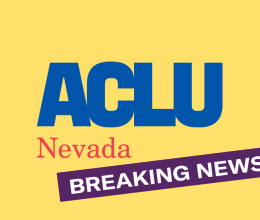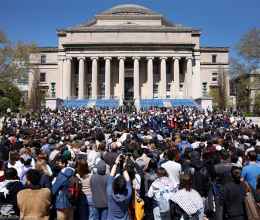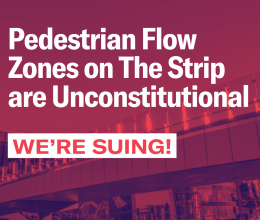
This piece was originally published in the Nevada Current by Michael Lyle.
The City of Las Vegas wants to ban people convicted of crimes from parts of downtown, replicating a Clark County ordinance passed last year that enabled a similar prohibition on the Las Vegas Strip.
Ahead of the proposal being introduced Wednesday at the Las Vegas City Council meeting, the ACLU of Nevada warns the measure, if passed, will see similar legal pushback the county is currently facing.
The “order out corridor” ordinance, sponsored by Las Vegas Mayor Carolyn Goodman, would pertain to areas surrounding the Fremont Street Experience, from Main Street to 8th Street through Bridger Avenue and Stewart Avenue.
A person convicted of any crime committed within the corridor would have to agree to stay out of the designated area for one year or be subjected to arrest.
The ordinance was heard Monday by the Recommending Committee, which refers proposals to the city council. The item will be introduced Wednesday but the council won’t deliberate or vote until the Nov. 15 meeting.
City of Las Vegas Department of Public Safety Chief Jason Potts said the ordinance was about public safety and enabling law enforcement to identify “chronic offenders.”
Athar Haseebullah, the executive director of the ACLU of Nevada, said the ordinance, if passed, would likely be used to target unhoused folks and street performers.
“This will allow the city to go after street performers, go after people who are unhoused on any number of offenses that shouldn’t even be offenses in the first place,” he said.
Hassebullah said the proposal would violate civil rights and that the organization is “happy to litigate” the constitutionality of the ordinance.
“We are pretty confident here that this provision is unconstitutional,” he said. “We don’t think it will uphold scrutiny by any supreme court and certainly not by the Nevada Supreme Court.”
Clark county unanimously approved its “order out corridor” ordinance in August 2022.
Haseebullah said the ACLU has struggled to obtain data from Las Vegas Metropolitan Police Department on how the ordinance is deployed.
The ACLU of Nevada, the Fines and Fees Justice Center, Nevada Attorneys for Criminal Justice and the UNLV Misdemeanor Clinic at the Boyd School of Law filed a joint amicus brief in August of this year that questions its constitutionality.
“The District Court’s decision to banish Ramsay from the Resort Corridor without explanation, even as a condition of probation, violates Ramsay’s right to access a transitional public forum under the First Amendment and right to travel in the Fourteenth Amendment,” according to the brief for Ackeem Ramsay v. State of Nevada.
The brief also states that the ordinance has targeted people experiencing homelessness in the on the Las Vegas Strip – the resorts industry praised the ordinance during a June legislative hearing when backing a bill to establish a $100 million fund to build a homeless campus.
Jace Radke, a spokesman with the City of Las Vegas, said the city doesn’t comment on ongoing litigation.
“The City Attorney is aware of the amicus brief in relation to the county ordinance and is monitoring that case,” he said via email.
The current case wasn’t mentioned during Monday’s Recommending Committee meeting.
During that meeting, Las Vegas City Attorney Jeff Dorocak said Metro Sheriff Kevin McMahill brought it to Goodman’s attention.
“Some of his anecdotal information was positive about its effects,” in Clark County, Dorocak said.
According to the bill’s language, the court may grant exceptions for people who work in the corridor or need to access social services, legal assistance, transportation and medical services.
If the court grants the exception, the person would have to carry around the order “at all times the person is located within the Order Out Corridor.”
While the “order out corridor” ordinance initially only included just the Fremont area, representatives from The Strat Hotel also proposed including the area surrounding the property.
Chief Jason Potts, with the Las Vegas Department of Public Safety, said the ordinance, if passed, will allow law enforcement to compile a list of “hot people that are the chronic offenders” and potentially share their photos with other officers.
That way, he said, officers can see someone “they know who has an order against them.”
While he didn’t explicitly identify the crimes they intended to target, Potts noted “juvenile crime” and gang activity have been a problem on Fremont Street.
Officers, he said, would “have probable cause the person is in violation of where they should be” enabling them to “approach and make an arrest if needed.”
Potts said the ordinance would give law enforcement “another tool in our toolbox” to be able to arrest “offenders who reoffend.”
Haseebullah countered that the ordinance would be “a dull tool used to beat down an issue that ends up being non-existent” but instead will “undermine civil liberties and civil rights.”
“If those are the tools in the toolbox, then we don’t want to see the rest of the toolbox,” he said.


